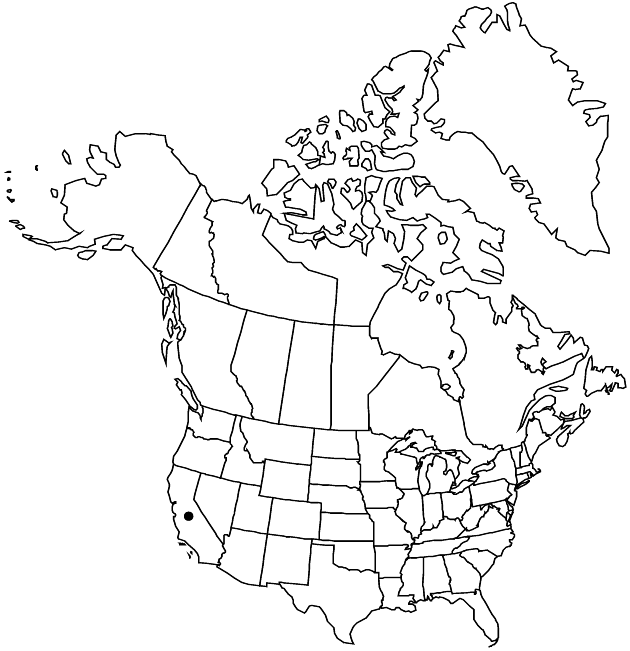Difference between revisions of "Psilocarphus chilensis"
in A. Gray et al., Syn. Fl. N. Amer. ed. 2, 1: 448. 1886.
FNA>Volume Importer |
FNA>Volume Importer |
||
| Line 15: | Line 15: | ||
|name=P. tenellus var. globiferus | |name=P. tenellus var. globiferus | ||
|authority=(Bertero ex de Candolle) Morefield | |authority=(Bertero ex de Candolle) Morefield | ||
| − | }}{{Treatment/ID/Synonym | + | }} {{Treatment/ID/Synonym |
|name=P. tenellus var. tenuis | |name=P. tenellus var. tenuis | ||
|authority=(Eastwood) Cronquist | |authority=(Eastwood) Cronquist | ||
| Line 33: | Line 33: | ||
|elevation=0–600 m | |elevation=0–600 m | ||
|distribution=Calif.;South America (Chile). | |distribution=Calif.;South America (Chile). | ||
| − | |discussion=<p>Psilocarphus chilensis occurs mainly in west-central California and central Chile; one recent collection is from southern California (western Riverside County). Ecotypes from coastal interdune areas are more lanuginose with shorter stems and internodes than intergrading populations farther inland; they are indistinguishable from the type of Micropus globiferus from Chile (J. D. Morefield 1992d). Psilocarphus chilensis and P. tenellus are at least as distinct as the other species of Psilocarphus; contrary to suggestions by A. Cronquist (1950), intermediates between the two are at most very uncommon.</p><!-- | + | |discussion=<p><i>Psilocarphus chilensis</i> occurs mainly in west-central California and central Chile; one recent collection is from southern California (western Riverside County). Ecotypes from coastal interdune areas are more lanuginose with shorter stems and internodes than intergrading populations farther inland; they are indistinguishable from the type of <i>Micropus</i> globiferus from Chile (J. D. Morefield 1992d). <i>Psilocarphus chilensis</i> and <i>P. tenellus</i> are at least as distinct as the other species of <i>Psilocarphus</i>; contrary to suggestions by A. Cronquist (1950), intermediates between the two are at most very uncommon.</p><!-- |
| − | --><p>Psilocarphus berteri I. M. Johnston is a superfluous name for P. chilensis. I. M. Johnston (1938) erroneously applied P. chilensis to a species not including the type of Micropus globiferus; such plants are here included in P. brevissimus var. brevissimus.</p> | + | --><p><i>Psilocarphus</i> berteri I. M. Johnston is a superfluous name for <i>P. chilensis</i>. I. M. Johnston (1938) erroneously applied <i>P. chilensis</i> to a species not including the type of <i>Micropus</i> globiferus; such plants are here included in <i>P. brevissimus </i>var.<i> brevissimus</i>.</p> |
|tables= | |tables= | ||
|references= | |references= | ||
| Line 58: | Line 58: | ||
|publication year=1886 | |publication year=1886 | ||
|special status= | |special status= | ||
| − | |source xml=https://jpend@bitbucket.org/aafc-mbb/fna-data-curation.git/src/ | + | |source xml=https://jpend@bitbucket.org/aafc-mbb/fna-data-curation.git/src/8f726806613d60c220dc4493de13607dd3150896/coarse_grained_fna_xml/V19-20-21/V19_765.xml |
|tribe=Asteraceae tribe Gnaphalieae | |tribe=Asteraceae tribe Gnaphalieae | ||
|genus=Psilocarphus | |genus=Psilocarphus | ||
Revision as of 15:14, 18 September 2019
Plants mostly greenish, thinly arachnoid-sericeous (in coastal forms grayish to whitish, ± lanuginose). Stems mostly (1–)2–7, ascending to ± prostrate; proximal internode lengths (2–)3–6 times leaf lengths. Capitular leaves erect to incurved, appressed to heads, ovate to broadly elliptic, widest in proximal 2/3, longest 5–12 mm, lengths mostly 1.2–1.8(–2) times widths, 1–2(–2.5) times head heights. Heads ± spheric, largest 3–5.5 mm. Receptacles unlobed. Pistillate paleae usually individually visible through indument, longest mostly 1.5–2.7 mm. Staminate corollas 0.8–1.3 mm, lobes mostly 4. Cypselae narrowly obovoid, somewhat compressed, 0.6–1.2 mm.
Phenology: Flowering and fruiting mid Mar–early Jul.
Habitat: Saturated to drying vernal pool margins, seasonally inundated sites, coastal interdune areas
Elevation: 0–600 m
Distribution

Calif., South America (Chile).
Discussion
Psilocarphus chilensis occurs mainly in west-central California and central Chile; one recent collection is from southern California (western Riverside County). Ecotypes from coastal interdune areas are more lanuginose with shorter stems and internodes than intergrading populations farther inland; they are indistinguishable from the type of Micropus globiferus from Chile (J. D. Morefield 1992d). Psilocarphus chilensis and P. tenellus are at least as distinct as the other species of Psilocarphus; contrary to suggestions by A. Cronquist (1950), intermediates between the two are at most very uncommon.
Psilocarphus berteri I. M. Johnston is a superfluous name for P. chilensis. I. M. Johnston (1938) erroneously applied P. chilensis to a species not including the type of Micropus globiferus; such plants are here included in P. brevissimus var. brevissimus.
Selected References
None.